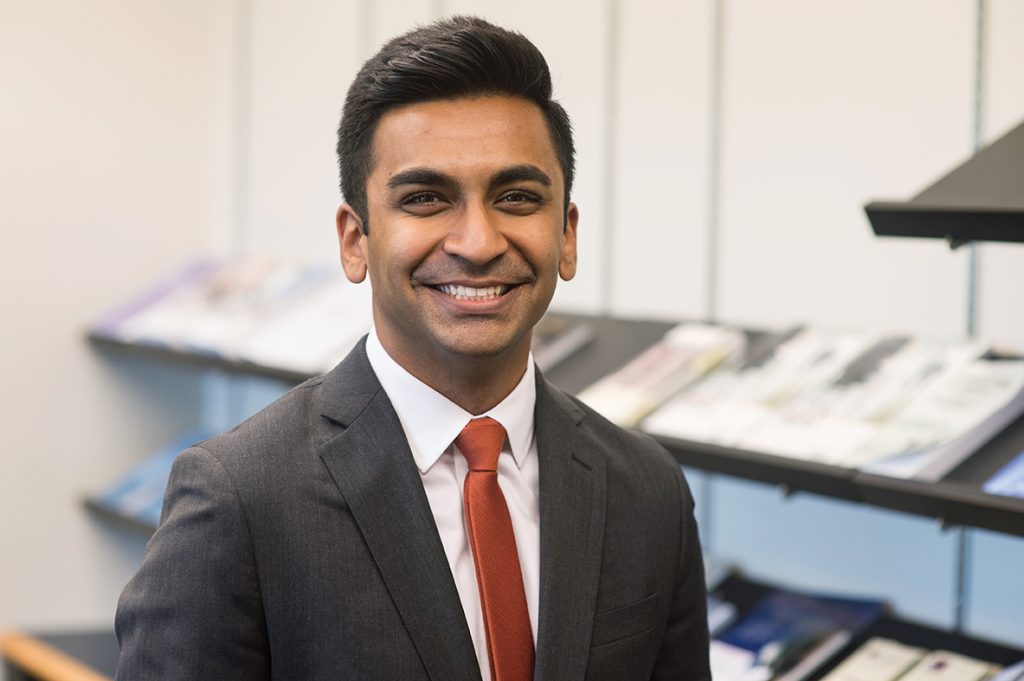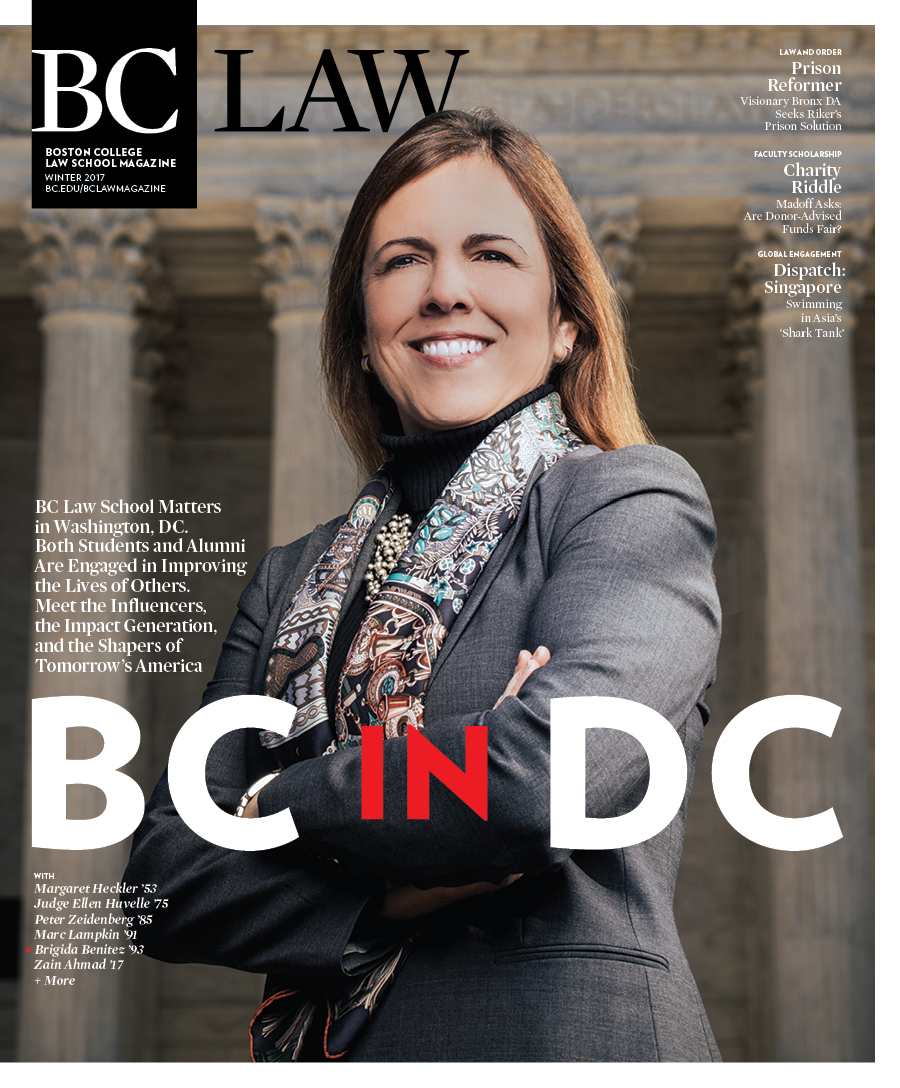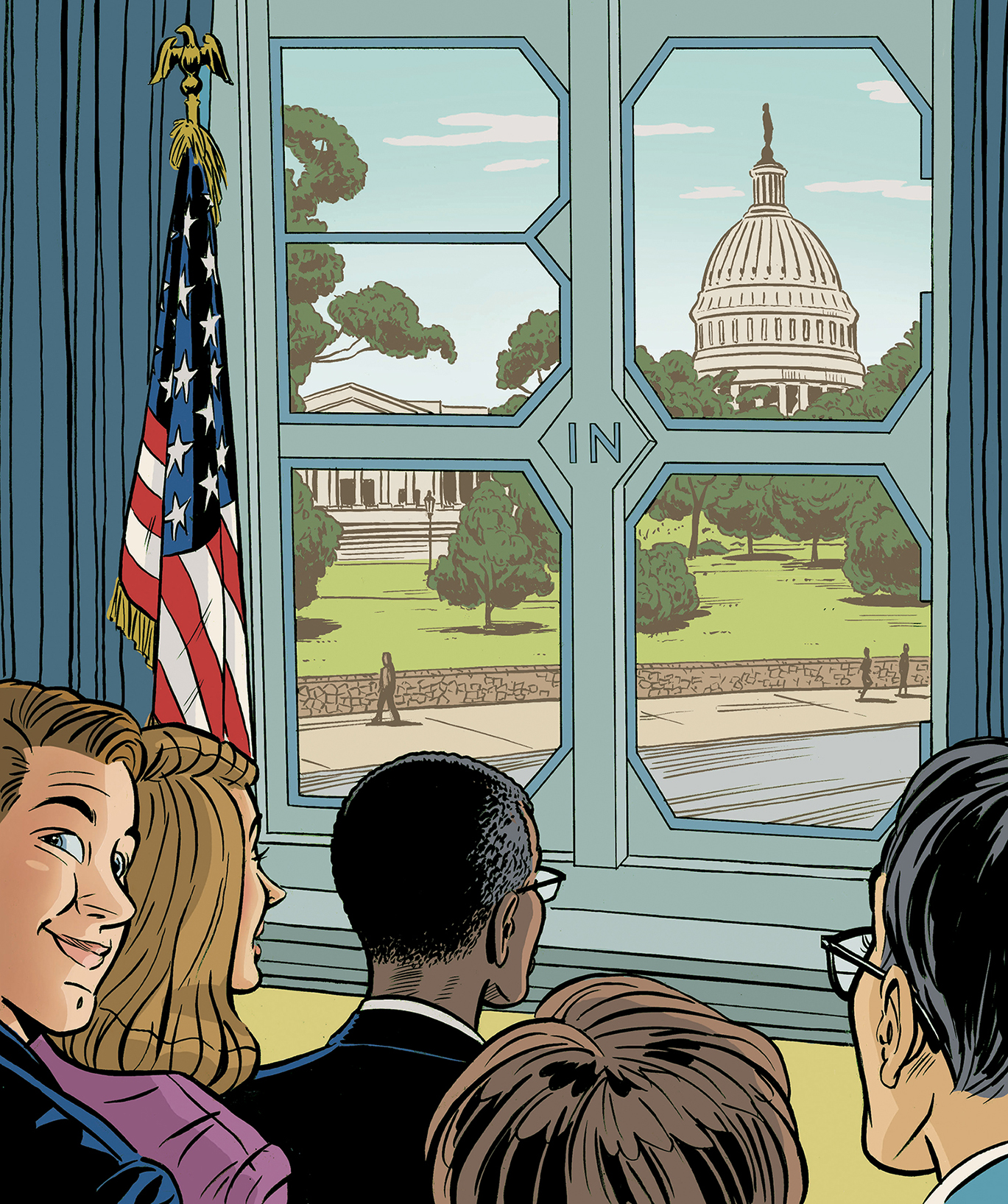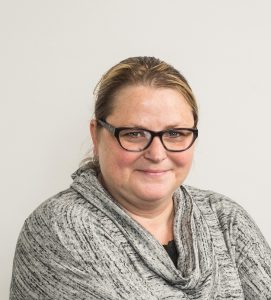It’s an age-old predicament: Employers want to hire people with experience, but how do you get that experience when nobody wants to hire you because you don’t have any? And, if you want to work in Washington, DC, there’s the double whammy: You need experience plus you need connections. BC Law successfully addressed that challenge with the launch in 2015 of the BC in DC Program. It enables current students to chart a clear path to working in the nation’s capital by providing them with a semester-long experiential work placement paired with a weekly academic seminar in DC.
“A big component of this experience is growing professionally and personally in terms of taking on uncertainty and getting really good advice from people who have had different career paths,” says Christine Leonard ’01, an adjunct faculty member who heads the BC in DC Program. Leonard leads the seminar and has a big day job herself: She is director of the Office of Legislative and Public Affairs for the US Sentencing Commission.
BC in DC is modeled on the Law School’s successful Semester-in-Practice Program, in which students spend up to thirty-eight hours a week working, while also attending a seminar for reflection on their experiences and for faculty guidance. “Experiential learning has really blossomed in the past few years,” says Kate Devlin Joyce ’02, associate director for externships and coordinator of the BC in DC Program. “BC in DC is a course in which students can have a placement in the private sector, government, or with an NGO. The weekly seminar is focused on law and public policy, and what it’s like to be a lawyer in Washington, DC.”
“BC in DC is a great segue between spending three years in an academic environment and jumping into the job market,” says Graham Markiewicz ’16, who spent last spring in a placement with the International Corporate Accountability Roundtable (ICAR), a coalition that ensures corporations respect human rights in their global operations. “I knew I wanted to work in policy and thought I would end up working in the corporate accountability space in business and human rights.”
One of Markiewicz’s projects at ICAR was developing guidelines issued by the Organisation for Economic Cooperation and Development (OECD). “They sent me to New York City to have a meeting with the national contact point of the OECD and a range of stakeholders. It was interesting because, coming from ICAR, I was treated as one of the experts and I was able to take part in the conversation about what these guidelines should look like and how government and private industry could partner for more efficient and effective guides,” he says. “I was way out of my depth but it was a really great experience to be part of the discussions.”
That sense of being out of one’s depth is not unusual for participants in BC in DC. In fact, it’s arguably one of the best aspects of the program because it enables students to confront real workplace challenges while still supported by the Law School.
Frances Ha ’17, who interned with the Tax Division of the US Department of Justice (DOJ), says a common theme in the seminar is striking the right note in interacting with supervisors. “We talk about how to communicate with the attorneys who supervise us—for example, to see if they can extend a deadline when necessary to make sure we are submitting our best work,” she explains.
“It’s different because in school there’s a lot of latitude for failure,” says Markiewicz. “It’s OK if you mess something up and you’re all there to learn. But that changes very quickly when you are doing real work that affects real people and their lives and livelihoods. It was good to sit back once a week and think about things to slow the pace down.”
In addition to the weekly discussions, students must give two oral presentations, keep a weekly journal, and write a paper on a topic of their choosing. They receive a midterm and final evaluation from their externship supervisors.
Gail Krutov ’17 presented her paper on the Internet of Things, which is generally described as machine-to-machine communication with the power to transform lives. “When building and designing tech products, companies are often more focused on innovation than on protecting the consumer’s information,” says Krutov. “They do not always incorporate proper privacy settings into the product, nor do they always have the tools to prevent a hacking.”
Krutov explored those tensions during her placement with the Federal Trade Commission (FTC). She found the position with the help of Joyce. “I told Kate I wanted to work at the FTC and she put me in touch with a BC alum who works at the FTC, Megan Cox ’12, in the Bureau of Consumer Protection. Megan helped me figure out the options and how to go about getting an internship.”
To help create those types of connections, Leonard has recruited BC Law alumni in the area to speak at the seminar. Last November, Catherine Sheehan Bruno ’95, special assistant in the FBI Office of Integrity and Compliance, took the students on a tour of exhibits at FBI headquarters. “You don’t necessarily realize when you think of the FBI that we have everything from our criminal responsibilities, which include counter-terrorism, cybercrime, the civil rights portfolio, and organized crime, to the work of our lab, hostage rescue team, Weapons of Mass Destruction Directorate. So, when you go through the exhibits, you get a sense of how broad things are.”
In response to student questions about how the presidential transition might affect job prospects, Bruno was sanguine. “I let them know that they shouldn’t be discouraged,” she says. “Sometimes you hear the government is or isn’t hiring. You should always put yourself out there and never give up. Keep applying for things, keep trying. Use your network.”
It’s that kind of advice and those kinds of connections that make the BC in DC Program so valuable to students. “The great thing is to meet people in person instead of by phone,” says Krutov. “Applying to jobs while I’m here and getting to know more people has been very beneficial.”

To date, twelve students have completed the BC in DC Program. There are no restrictions on where the students work, though the strongest interest has been in government. Students have worked for, among others, the US Department of Justice, the Consumer Financial Protection Bureau, the Financial Industry Regulatory Authority, NGOs, Congress, and the White House. Leonard says the program shoots for between four and six students per semester given the intimate, seminar-style academic portion of the program.
The placements offer valuable opportunities: Cynthia Gonzalez ’17, who spent the fall with Human Rights First, an independent advocacy organization, was assigned to guide a client through her first court appearance. “I remember thinking, ‘Are they really asking me to go to court alone? Are they really asking me to be the face of Human Rights First right now?’” recalls Gonzalez, who secured a continuance for her client. “That was a bit of a getting-thrown-into-the-fire situation, but, honestly, I came to law school to do exactly this type of work.”
Zain Ahmad ’17, who interned in the White House Office of Science and Technology Policy, says the people he has worked with are incredibly knowledgeable and helpful. Though Ahmad has a post-grad position lined up with Goodwin Procter in New York City, he used his BC in DC opportunity to dive into his tech interests.
“I had coffee with the assistant director for civil and commercial space policy,” he notes. “We discussed my interest in the commercialization of space and space exploration and he put me in touch with individuals from the industry. Most people would stop at this point. But he went further and laid out a possible career path and invited me to space policy social gatherings around DC. This was just one of many interactions in which I gained valuable insight and experience.”
Ha was the only intern in the Office of Review in the DOJ’s Tax Division this fall. “I was able to work on summary judgment motions, drafting complaints, and subpoenas,” says Ha, who plans a career in tax law. “The most interesting work was to write a letter to opposing counsel arguing why the US government needs a better settlement because the law is with us. My initial assignment was not to draft the letter, but to do legal research, but the letter ended up being based on my work. That was a real ego booster.”
“A lot of law school tends to be a pipeline from courses to summer internship to junior associate. It’s very lockstep,” says Markiewicz. “So much of practicing law in policy is not that way. Christine and our guest speakers were very helpful in guiding us in how to look for jobs.”
“I think there is a unique aspect of the hiring process in Washington. In many ways, it’s still a town where people prefer to hire individuals with prior experience in Washington,” says Leonard.
That certainly proved true for Markiewicz: He’s now working on Capitol Hill as legislative assistant to Congressman Denny Heck (D-WA, 10th District).




